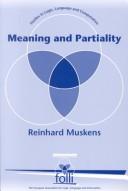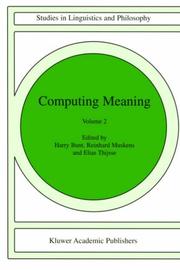| Listing 1 - 2 of 2 |
Sort by
|

ISBN: 1881526798 1881526801 9781881526797 Year: 1995 Publisher: Stanford (Calif.): CSLI,
Abstract | Keywords | Export | Availability | Bookmark
 Loading...
Loading...Choose an application
- Reference Manager
- EndNote
- RefWorks (Direct export to RefWorks)
Muskens radically simplifies Montague Semantics and generalises the theory by basing it on a partial higher order logic resulting in a theory which combines important aspects of Montague Semantics and Situation Semantics. Richard Montague formulated the revolutionary insight that we can understand the concept of meaning in ordinary languages much in the same way as we understand the semantics of logical languages. Unfortunately, he formalised his idea in an unnecessarily complex way. The present work does away with unnecessary complexities, obtains a streamlined version of the theory, shows how partialising the theory automatically provides us with the most central concepts of Situation Semantics, and offers a simple logical treatment of propositional attitude verbs, perception verbs and proper names.
Lexicology. Semantics --- Semantics --- Language and logic --- Semantics. --- Language and logic.

ISBN: 0792361083 1402006306 9781402006302 1402001754 9781402059568 9048160235 9401700850 1402004516 9401005729 1402002904 9401142319 9780792361084 Year: 2007 Volume: 73, 77, 83 Publisher: Dordrecht : Springer,
Abstract | Keywords | Export | Availability | Bookmark
 Loading...
Loading...Choose an application
- Reference Manager
- EndNote
- RefWorks (Direct export to RefWorks)
This book is a collection of papers written by outstanding researchers in the newly emerging field of computational semantics. Computational semantics is concerned with the computation of the meanings of linguistic objects such as text fragments, spoken dialogue utterances, and e-mail messages. The meaning of such an object is determined partly by linguistic information and partly by information from the context in which the object occurs. The information from these sources is combined by processes that infer which interpretation of the object applies in the given context. This applies not only to notoriously difficult aspects of interpreting linguistic objects, such as indexicals, anaphora, and metonymy, but also to establishing the precise reference of common nouns and the scopes of noun phrases. The central issue in computational semantics is how processes of finding and combining the relevant linguistic and contextual information into contextually appropriate meanings can be organised. Traditional approaches of applying context information to disambiguated natural language expressions do not work well, due to the massive ambiguity in natural language. Recent work in computational semantics suggests, alternatively, to represent linguistic semantic information in formal structures with underspecification, and to apply context information in inference processes that result in further specification of these representations. Underspecified representation and inference are therefore the key topics in this book. The book is aimed at those linguists, computer scientists, and logicians who take an interest in the computation of meaning, and who want to know what is happening in this exciting field of research.
Semantics --- Formal languages --- Data processing. --- Semantics. --- Inconsistency (Logic). --- Science --- Philosophy. --- Philosophy of science --- Inconsistency (Logic) --- Sciences --- Inconsistance (Logique) --- Philosophie --- Sémantique --- Langages formels --- Data processing --- Informatique --- Normal science --- Philosophy --- Logic --- Natural language processing (Computer science). --- Computational linguistics. --- Logic. --- Artificial intelligence. --- Natural Language Processing (NLP). --- Computational Linguistics. --- Artificial Intelligence. --- AI (Artificial intelligence) --- Artificial thinking --- Electronic brains --- Intellectronics --- Intelligence, Artificial --- Intelligent machines --- Machine intelligence --- Thinking, Artificial --- Bionics --- Cognitive science --- Digital computer simulation --- Electronic data processing --- Logic machines --- Machine theory --- Self-organizing systems --- Simulation methods --- Fifth generation computers --- Neural computers --- Argumentation --- Deduction (Logic) --- Deductive logic --- Dialectic (Logic) --- Logic, Deductive --- Intellect --- Psychology --- Reasoning --- Thought and thinking --- Automatic language processing --- Language and languages --- Language data processing --- Linguistics --- Natural language processing (Linguistics) --- Applied linguistics --- Cross-language information retrieval --- Mathematical linguistics --- Multilingual computing --- NLP (Computer science) --- Artificial intelligence --- Human-computer interaction --- Semantic computing --- Formal semantics --- Semasiology --- Semiology (Semantics) --- Comparative linguistics --- Information theory --- Lexicology --- Meaning (Psychology) --- Methodology --- Philosophy and science. --- History. --- Philosophy of Science. --- History, general. --- Annals --- Auxiliary sciences of history --- Science and philosophy --- Semantics - Data processing. --- Formal languages - Semantics.
| Listing 1 - 2 of 2 |
Sort by
|

 Search
Search Feedback
Feedback About UniCat
About UniCat  Help
Help News
News